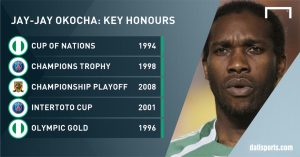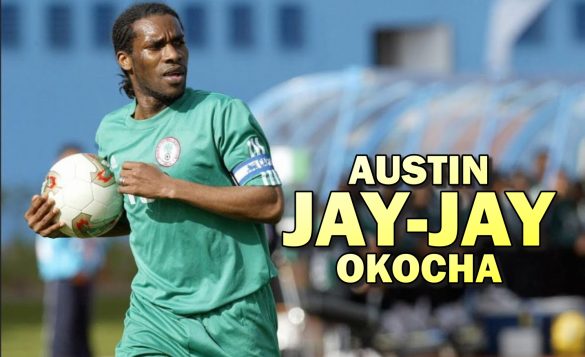 Austin “Jay-Jay” Okocha is widely regarded as one of the most skillful and influential footballers to have emerged from Africa. His career spanned over two decades, during which he dazzled fans with his exceptional flair, creativity, and technical brilliance. Okocha’s impact on the pitch was not just about winning matches but also about entertaining and inspiring millions of football lovers around the world including myself. This analysis delves into the elements that make Jay-Jay Okocha a perfect player, exploring his skills, achievements, influence, and legacy.
Austin “Jay-Jay” Okocha is widely regarded as one of the most skillful and influential footballers to have emerged from Africa. His career spanned over two decades, during which he dazzled fans with his exceptional flair, creativity, and technical brilliance. Okocha’s impact on the pitch was not just about winning matches but also about entertaining and inspiring millions of football lovers around the world including myself. This analysis delves into the elements that make Jay-Jay Okocha a perfect player, exploring his skills, achievements, influence, and legacy.
Early Life and Career Beginnings
Austin J.J. Okocha was born on August 14, 1973, in Enugu State, Nigeria. He was introduced to football at a young age, playing street soccer like many of his peers. Football wasn’t just a sport for Okocha; it was a passion that drove him to spend countless hours honing his skills. This early exposure to the game, combined with his natural talent, set the foundation for what would become a legendary career.
Okocha’s professional journey began in 1990 when he joined the Nigerian club Enugu Rangers. His performances at Enugu Rangers caught the attention of scouts from Europe, and in 1992, he made a significant move to Germany, joining Bundesliga side Eintracht Frankfurt. This move marked the beginning of Okocha’s rise to international prominence.
Skill Set and Playing Style
One of the defining aspects of Jay-Jay Okocha’s game was his extraordinary skill set. Okocha was not just a player who could dribble past opponents; he was an artist with the ball at his feet. His dribbling skills were unmatched, as he could glide past defenders with ease, often leaving them bewildered. His ability to control the ball in tight spaces, coupled with his quick footwork, made him a nightmare for defenders.
Okocha’s creativity and vision on the field were equally remarkable. He had the ability to see passes that others couldn’t, often executing them with precision. His flair for the unpredictable meant that he could turn a game on its head with a moment of magic, whether it was a deft pass, a clever flick, or a long-range shot.
Versatility was another key aspect of Okocha’s game. He was primarily an attacking midfielder but was comfortable playing in various positions across the midfield and attack. Whether deployed as a central playmaker, a winger, or even as a forward, Okocha’s influence on the game was always evident.
One of the most memorable aspects of Okocha’s skill set was his mastery of free kicks and set pieces. He had a unique ability to strike the ball with power and precision, often curling it past helpless goalkeepers. His free-kick against Oliver Kahn in the 1992-93 Bundesliga season remains one of the most iconic goals in the history of German football.

Okocha’s Profile
Key Milestones and Achievements
Throughout his career, Okocha achieved numerous milestones that cemented his status as one of the greats. His time at Eintracht Frankfurt was marked by several outstanding performances, but it was at Paris Saint-Germain (PSG) where Okocha truly became a global superstar. Joining PSG in 1998 for a then-African record transfer fee, Okocha quickly became the heartbeat of the team, guiding them to domestic success and making a significant impact in European competitions.
Okocha’s influence extended to the international stage as well. As a key member of the Nigerian national team, Okocha played a pivotal role in the Super Eagles’ successes in the 1990s and early 2000s. He was instrumental in Nigeria’s triumph at the 1994 Africa Cup of Nations and played a crucial role in the team’s historic gold medal win at the 1996 Atlanta Olympics.
One of Okocha’s most memorable periods was his time at Bolton Wanderers in the English Premier League. Joining Bolton in 2002, Okocha became an instant fan favorite, not just for his skills but also for his leadership qualities. He helped the club avoid relegation in his first season and later guided them to their highest-ever Premier League finish. His performances at Bolton earned him widespread recognition, and he was twice named Bolton’s Player of the Year.
Okocha’s individual accolades are a testament to his exceptional talent. He was named the BBC African Footballer of the Year twice, in 2003 and 2004, and was included in the CAF Team of the Year multiple times. His performances in major tournaments, such as the Africa Cup of Nations and the FIFA World Cup, further solidified his reputation as one of the best African players of all time.
Okocha’s Influence in Football
Jay-Jay Okocha’s influence in football extends far beyond his on-field performances. In Nigeria, he is a national hero, having inspired an entire generation of footballers. His success in Europe, particularly in Germany, France, and England, helped to elevate the status of African footballers on the global stage. Okocha was among the first wave of African players to become household names in Europe, paving the way for future stars like Didier Drogba, Samuel Eto’o, and Yaya Touré.
Okocha’s style of play, characterized by flair, creativity, and entertainment, has left a lasting impact on football. He was one of the few players who could bring joy to the game, not just by winning but by making the game fun to watch. His ability to entertain while being effective made him a beloved figure, not just among fans of his clubs but among football enthusiasts worldwide.
Okocha’s influence also extends to his role as a mentor and ambassador for the sport. After retiring, he remained involved in football, taking up various roles, including serving as the chairman of the Delta State Football Association in Nigeria. He has also been involved in football development projects, helping to nurture young talents and promote the sport in Africa.
Personality and Leadership
Beyond his skills on the pitch, Jay-Jay Okocha was known for his charismatic personality and leadership qualities. He was a natural leader, both for his clubs and the Nigerian national team. Okocha was appointed captain of the Super Eagles in 2002, a role he embraced with distinction. Under his captaincy, Nigeria reached the semifinals of the 2004 Africa Cup of Nations and qualified for the 2002 and 2006 FIFA World Cups.
Okocha’s leadership was not just about wearing the captain’s armband; it was about leading by example. He was known for his professionalism, work ethic, and ability to inspire his teammates. His positive attitude and calm demeanor made him a respected figure in the dressing room, and his influence extended beyond the pitch.
One of the defining moments of Okocha’s leadership came during his time at Bolton Wanderers. Despite joining the club at a time when they were battling relegation, Okocha’s presence and performances were instrumental in turning the club’s fortunes around. His ability to lift the team’s spirits and drive them to achieve success was a testament to his leadership qualities.
 Legacy and Comparison with Other Greats
Legacy and Comparison with Other Greats
Comparing Jay-Jay Okocha with other legendary midfielders is a complex task, given the uniqueness of his style and the era in which he played. However, when discussing players with similar skill sets and impact, names like Ronaldinho, Zinedine Zidane, and George Best often come to mind. Like these greats, Okocha had the ability to mesmerize audiences with his flair and creativity. He was a player who could single-handedly change the course of a game, much like Ronaldinho’s magic at Barcelona or Zidane’s brilliance at Real Madrid.
Okocha’s legacy in football is one of joy, entertainment, and inspiration. He may not have won as many trophies as some of his contemporaries, but his impact on the game goes beyond silverware. Okocha’s ability to bring smiles to the faces of fans, his contributions to the global recognition of African football, and his role as a mentor to younger players all contribute to his lasting legacy.
In Nigeria, Okocha is celebrated as one of the greatest footballers the country has ever produced. His flair, creativity, and skill on the ball made him a household name not only in Nigeria but also on the global stage. Known for his mesmerizing dribbles and stunning free-kicks, Okocha became a symbol of footballing excellence and inspired a generation of young players to pursue their dreams.
Okocha’s impact extended beyond the pitch; he became a cultural icon in Nigeria. His success in Europe, particularly during his time at Paris Saint-Germain and Bolton Wanderers, showcased the potential of Nigerian talent on the international stage. His contributions to the Super Eagles, including leading the team to victory in the 1994 African Cup of Nations and competing in multiple World Cups, further solidified his legendary status.
Conclusion
Jay-Jay Okocha’s legacy in Nigerian football is unmatched. His influence transcends the game, serving as a reminder of the heights that can be achieved with talent, determination, and passion. For many Nigerians, Okocha is not just a football legend but a national hero whose contributions to the sport will be remembered for generations to come.

